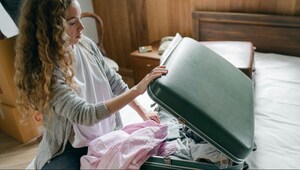Gasp! 13 Surprising Reasons You Keep Breaking Out
Your period isn't the only thing causing your acne.

Breakouts are the worst. And if you're one of the 40 to 50 million Americans that acne affects, according to the American Academy of Dermatology, then you know just how much it sucks.
So, what causes this skin disorder ruiner of first dates slash everything? Mainly the overproduction of oil; blocked hair follicles that don't allow the aforementioned oil to leave the pore, which often results in a clogged pore; and the growth of bacteria inside the hair follicles aka P. acnes.
However, along with the above factors and genetics—which plays a role in how your body reacts to different hormones in your body that also cause acne—there are certain patterns you could be repeating on a daily basis that result in, or can even exacerbate, your already annoying issue. Here are some of the most surprising triggers—take notes, acne-prone people, so you, too, can have blemish-free, glowing skin!
You're using products that contain pore-clogging ingredients.
Mineral oil, for example, is a super-heavy moisturizing agent found in some lotions that's also known to clog your pores and break you out. Silicones, also common in skin care and cosmetics, are another ingredient that can plug up your pores, resulting in blemishes, according to Dr. Jeanine Downie, a cosmetic dermatologist in Montclair, New Jersey.
What you can do differently: Make sure all the skin care products you're using are labeled noncomedogenic, which means your makeup or skin care has been specifically formulated not to clog your pores. That said, if the product is noncomedogenic and your breakouts continue to worsen, make an appointment with your dermatologist as you could be allergic to another ingredient in the product that's causing your issues.
You're OD'ing on spot treatments.
Overusing topical salicylic acid, benzoyl peroxide, or sulphur over-the-counter treatments can dry out your skin, causing your complexion to produce more oil and, in turn, blemishes. So, while you're turning to spot treatments to minimize the appearance of your acne, it can actually make it look worse—if you're not using it correctly. Especially since the active ingredients can slightly burn the top layer of your skin, making it look red and raw if you're using the formula too often. This also makes the pimple harder to conceal than if you would have just left it alone, according to Samantha Wright, a licensed aesthetician at the Dangene Institute.
What you can do differently: Instead of dousing your zit with a spot treatment every single night, apply a dab of OTC one percent hydrocortisone cream, like Aveeno One Percent Hydrocortisone Anti-Itch Cream, onto the site two to three times during the day to take down inflammation and redness. Then, camouflage it (if you want!) by simply covering it up with a concealer, like Clinique Even Better Compact Makeup, which has antibacterial ingredients to keep the formula bacteria-free—and your face clear. I'm not telling you to never use spot treatment again, just don't overdo it—two to three times a week, every other night won't hurt; however, if your skin reacts to the treatment, switch to the aforementioned hydrocortisone cream to calm the blemish.
You're eating spicy foods.
Spicy foods often contain tomatoes and peppers, which contain acidic lycopene that can be an irritant to some people, Dr. Downie says, throwing off their skin's pH levels and triggering breakouts. However, it isn't just spicy foods that can irritate your skin. Some people have an aversion to dairy, bread, or other types of foods. How your skin reacts to what you eat just depends on your own personal make-up.
What you can do differently: Take a break from eating spicy foods (if your skin is irritated by a certain ingredient, you'll recognize tiny whiteheads or even blemishes in a rash-like pattern around your chin or mouth) for a month to see if that's the cause of your issue. If the problem persists, talk to your dermatologist or make an appointment with a gastroenterologist to see if something more serious is going on in your gastrointestinal tract.
Your hair products are wreaking havoc on your skin.
The sulfates (cleansing agents), heavy moisturizing agents, and silicones that your shampoo, conditioner, and stylers may contain can seep into your pores, clogging them, resulting in chest acne, bacne, or pesky pimples along your hairline, according to Wright.
What you can do differently: When washing and conditioning your hair in the shower, tilt your head over to the side to keep the product's residue off your face, chest, and back as you rinse it away. And be sure to wash your face last when you're in the shower to make sure you haven't accidentally gotten any product on your skin that could break you out later. If it's your back that's breaking out, wash it last after you rinse your hair out, since the ingredients that are sitting on your skin could be clogging your pores.
You're scrubbing your skin too hard.
If you're of the mindset that the more you scrub your skin—whether with a washcloth, rough exfoliants (like crushed apricot seeds), loofahs or cleansing brushes—the smoother it will be, I'm here to tell you that your zit-uation will only inevitably get worse. Here's why: When you scrub the active acne, you drag the blemish's bacteria across your skin, worsening the existing condition and possibly even causing it to spread.
What you can do differently: Gently wash and moisturize your face with a gentle yet effective system (cleanser, toner, moisturizer) that contains pore-clearing ingredients, like alpha hydroxy acids and glycolic and lactic acids. That way you keep the scrubbing to a minimum. Wright recommends Obagi Foaming Gel, Toner and Exfoderm Lotion, her favorite system to suggest for Dangene's acne-prone clients.
You're a make out bandit and your boyfriend has a beard.
Sure, some dudes look hot with a beard (I see you, Ryan Gosling) or even a five o'clock shadow, but your BF's facial hair isn't doing your pretty face any favors when it comes to breakouts. Long story short: as you and your guy hook up, your smooth face rubs against his hairy one, creating friction, which causes his prickly hair to stimulate oil production on your face, causing blemishes and even beard burn. Ouch!
What you can do differently: Kindly ask him to shave his beard in the name of flawless skin. Or, beg him to condition his beard with coconut oil, so the tiny hairs don't feel like mini swords stabbing your face every time you kiss—and possibly leaving you with a new patch of pimples the next day.
You smoke.
Every time you light up a cigarette, you decrease the amount of oxygen that goes to your facial skin, Dr. Downie explains. Smoking not only predisposes you to cancer, it causes the breakdown of collagen and elastin that leads to wrinkles and increased pore size. What's more, the carcinogens in the smoke also irritates your skin and dries it out, triggering it to produce more oil and possibly more breakouts.
What you can do differently: Don't smoke. It's as simple as that. You'll live longer and have clearer skin.
You can't stop picking at your pimples.
It's tempting in the moment, but it's never a good idea to play dermatologist, because it's impossible to pick your own pimple and not make a red mark that could turn into a scar. Even worse, when you try to press the oil plug or puss out of your pore, you run the risk of pushing the bacteria deeper, spreading it around underneath your skin, multiplying your pimples. This can also cause raised bumps of scar tissue that never go away—this I know from personal experience.
What you can do differently: Challenge yourself not to pick or even touch your face for unnecessary reasons, since you can transfer bacteria onto your skin that way, per Wright. Not touching your face works wonders for your complexion, because it allows your zits to heal on their own, leaving your skin scar-free. If you need to physically put something over your pimple to keep your hands off of it (and to prevent more bacteria from getting into the zit), try the Mighty Patch Hydrocolloid Acne Absorbing Spot Dot, a flat, flexible, drug-free patch that protects your spot, allowing it to heal faster.
You're not releasing pent-up stress properly.
Stress triggers acne and acne results in more stress—ah, the very vicious cycle. Basically, when you're under pressure, your skin produces stress hormones, including cortisol, that can stimulate your oil glands to make testosterone, Dr. Downie explains. This then increases more oil production, clogging your pores.
What you can do differently: Work out regularly, meditate, and take time out of your busy schedule to focus on yourself. All of these things will help you release stress, so your body doesn't continue to release hormones wreak havoc on your skin.
You're using the wrong detergent.
Per Dr. Downie, some of the chemicals in certain laundry detergents can be too harsh for your skin. And once you slip on your clothes or lie on your pillow, your complexion might react to the residue that's left on the fabric, resulting in breakouts on your face, back, butt, chest, etc.
What you can do differently: Choose a detergent that's fragrance- and dye-free and dermatologist-tested for sensitive skin, like Seventh Generation Concentrated Free & Clear Unscented Laundry Detergent.
You're wearing a lot of hats or constantly touching your face.
Anything that can trap sweat and bacteria against your skin and clog your pores, like the lining of a tight hat, can cause zits to crop up. Also, touching your face or resting your chin in your hand while you're sitting at your desk (guilty!) can transfer bacteria from your hand onto your face, causing blemishes to brew, she adds.
What you can do differently: Yes, hats are fashionable, but switch up your style and go without wearing one for a bit to see if that's the root of your pimple problem. Also, keep your hands away from your face. Seriously, it's super easy to do.
You're not washing your face/body after you work out.
Skipping the shower right after working out or not washing your face, at the very least, allows the makeup, dirt, bacteria, and oil (that was already on your skin) mix with sweat—all of which will find a nice home in your pores, settling into your warm skin, causing breakouts to eventually surface.
What you can do differently: Wipe your face, chest, and back down before you work out with facial wipes, like Neutrogena Makeup Remover Cleansing Towelettes, to remove your makeup. Then, if you don't have time to shower immediately after the gym, use another fresh facial wipe to clear away any sweat and bacteria on your skin to minimize the chance of new pimples popping up.
You're still a sun-worshipper.
You're probably already aware that lying out in the sun and going to tanning beds cause skin cancer, but if that still hasn't stopped you from hitting the beach without sunscreen or the proper protective gear (aka that chic sun hat), perhaps this will. Contrary to popular belief, the sun isn't healing your acne, it's actually making it worse. What happens is, as your face gets red from the sun, it makes any breakouts you might have blend right in, creating the appearance of clearer skin. But what's really going on is that on top of making your face red, the sun is drying out your skin and triggering more oil production, which can lead to more zits.
What you can do differently: For starters, stop going to tanning beds. Period. And if you are in the sun, make sure to slather on a titanium dioxide- or zinc-based sunscreen—(these natural sun protectants and their formulations below contain fewer chemicals, so they won't break you out as easily), and wear a sun hat or ball cap to shield your facial skin from harsh rays.
more from Beauty

8 vanilla-infused beauty products for summer

#AllEyesOnB: Beauty launches on our radar this April

Typsy Beauty is changing the way you think about makeup

Just calculated Taylor Swift’s net worth and now I’m crying

Your most pressing questions about Bipolar 1 Disorder, answered by people who know

What the first trip with your partner says about your relationship

Signs that you’re a bad packer on your holidays and how to avoid them

Lessons that my string of unhealthy relationships taught me

Everything you need to know about the "Who is Your Chicago?" trend

Masoom Minawala pens down a quintessential guide for every woman who wants to prove the world wrong
